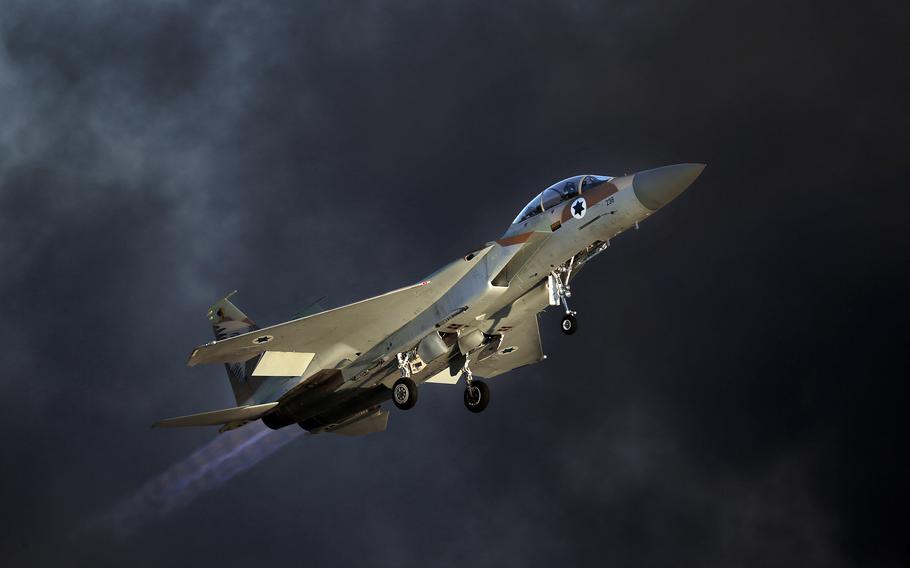
An Israeli F-15 fighter jet. Boeing manufactures the F-15, which was developed by McDonnell Douglas before that company's acquisition by Boeing. (Thomas Coex/AFP/Getty Images/TNS)
(Tribune News Service) — As opposition to Israel’s Gaza war intensifies, so too has the attention on Boeing’s longstanding connection with Israel and the Israeli armed services’ use of Boeing weapons.
On campuses across the U.S., including this week’s encampment at the University of Washington, and outside Boeing’s Virginia headquarters, protesters have assailed Boeing for its involvement in the Israel-Hamas war. Students have called for their universities to cut ties with the aviation giant, demands that last week saw Portland State University administrators agree to temporarily stop accepting Boeing money, one of 13 demands made by students there.
Following an Oct. 7 attack on Israel during which Hamas militants killed 1,200 people and took scores of hostages, Israel launched an extensive air and ground war on Gaza that so far has killed more than 34,000 Palestinians, including militants and civilians, according to Gazan health officials. Women and children account for around two thirds of those killed in Gaza.
President Joe Biden signed a$95 billion war aid measure in late April that included assistance for Israel, Ukraine and other conflict areas. The legislation included $26 billion in aid for Israel and about $1 billion for humanitarian relief for Palestinians in Gaza.
In a statement, U.S. Rep. Pramila Jayapal, a Washington Democrat who voted against the Israel Security Supplemental Appropriations Act, said she believed there was a “moral imperative” to find another path.
“Most Americans do not want our government to write a blank check to further Prime Minister Netanyahu’s war in Gaza,” the Seattle Democrat said in a joint statement with 18 other lawmakers. “The United States needs to help Israel find a path to win the peace.”
While the exact extent to which Boeing has armed Israel remains murky, Boeing remains a major supplier to the Israel Defense Forces.
The Boeing-Israel relationship goes back decades, since the founding of Israel, and the connection is worth billions of dollars in commercial aviation and defense.
Israel has received more military aid from the U.S. than any other country since World War II, and Boeing has had a role since 1948, when, according to the company, the Israeli Air Force flew Boeing’s B-17 Flying Fortress. Israel’s national airline, El Al, operates an all-Boeing fleet, and the company has an office in Tel Aviv.
Over the past decade, thousands of weapons systems and munitions manufactured by Boeing, including aircraft and bombs, have been transferred from the U.S. to Israel, according to an analysis of the Stockholm International Peace Research Institute’s Arms Transfers Database.
Boeing is among the top defense contractors in the U.S., along with companies like Lockheed Martin and Northrop Grumman. Boeing’s Defense, Space and Security unit is based in Arlington, Va., and had a revenue of $24.9 billion, accounting for about a third of Boeing’s total revenues in 2023, according to a company earnings report.
Boeing declined to respond to inquiries on its business with Israel and referred questions to the U.S. Department of Defense.
Boeing Defense CEO Ted Colbert in February 2023 visited Israel and met with Israeli Prime Minister Benjamin Netanyahu and Defense Minister Yoav Gallant. At a meeting with reporters at Boeing’s Tel Aviv office, Colbert said the company remained committed to serving Israel, the Times of Israel reported at the time.
CNN reported last month that the Biden administration was close to approving the $18 billion-plus sale of F-15 fighter jets to Israel, a move that requires congressional notification.
With Israel Aerospace Industries, Boeing codeveloped the Arrow 3, part of Israel’s missile defense system used recently to intercept Iranian missiles and drones fired at Israel during a retaliatory strike. In 2022, Boeing was awarded a $927 million contract to deliver to Israel four KC-46A Pegasus aircraft, according to the Department of Defense. The planes, primarily used for aerial refueling and airlift, are expected to be delivered in the next few years.
Soon after the Hamas attacks, Boeing committed $2 million to support medical, psychological and emotional trauma relief efforts in Israel.
Around the same time, the company accelerated delivery of 1,000 small diameter bombs to Israel that had been part of a 2021 contract, Bloomberg reported. Reports by Amnesty International have detailed attacks from Israel that killed Palestinian civilians using Boeing-made bombs.
Defense manufacturers generally don’t want to speak on political issues and instead are focused on running a business, said Dan Grazier of the Stimson Center, a Washington D.C.-based think tank focused on foreign policy.
But manufacturers making these products understand they are intended for war, with the general attitude that once the products are delivered, they are the responsibility of someone else, Grazier said.
“That is an ongoing challenge that all U.S. defense manufacturers have, and those all over the world have: paying attention to where those products end up,” Grazier said.
William Hartung of the Quincy Institute for Responsible Statecraft said by email that that doesn’t absolve companies of the results of the weapons they produce.
“Saying they are just following government policy doesn’t excuse supplying weapons that are used to commit war crimes,” said Hartung, who focuses on the arms industry and U.S. military budget.
©2024 The Seattle Times.
Visit seattletimes.com.
Distributed by Tribune Content Agency, LLC.